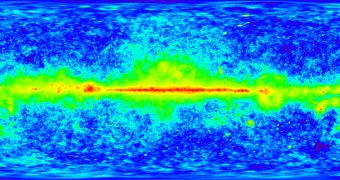A famous theoretical physicist in the United Kingdom argues that space and time were not something that appeared when the Big Bang spawned the Universe into being. In fact, they may be much older constructs that simply underlie this Cosmos as they did many other before it.
University of Oxford physicist Roger Penrose says that our current reality is not the first to have appeared. He is the developer of the conformal cyclic cosmology (CCC) model, which holds that this Universe is only the last in a continuous cycle.
The expert derived this hypothesis after studying the scientific results obtained by the NASA WMAP (Wilkinson Microwave Anisotropy Probe) spacecraft. The satellite is investigating the cosmic microwave background (CMB).
This CMB is made up of relic light produced during the Big Bang, and it permeates all corners of the Universe equally. But fine observations carried out with the WMAP determined that certain patterns can be extracted from the way this radiation is spread.
In a recent study, experts demonstrated that circular patterns permeate the CMB. Penrose interprets this as evidence that the Universe is only an “aeon” among many others that came before it.
He is also opposing the inflationary model – the most widely accepted one in cosmology – saying that the Big Bang, as it's currently defined, couldn't have produced the Cosmos we see today.
Modern thinking about the origins of everything says that the entire firmament originated in a single point of infinite energy and density. After expanding tremendously fast for a split-second (the Big Bang), it began to slowly expand, at an ever-accelerated pace.
Penrose explains that the inflationary model “cannot account for the very low entropy state in which the universe was believed to have been born – an extremely high degree of order that made complex matter possible,” Physics World reports.
“He does not believe that space and time came into existence at the moment of the Big Bang but that the Big Bang was in fact just one in a series of many, with each big bang marking the start of a new 'aeon' in the history of the Universe,” it adds.
The physicist believes that the Cosmos will at the end of its life span organize itself in form that will enable it to transition smoothly to the next aeon via another Big Bang, Daily Galaxy reports.

 14 DAY TRIAL //
14 DAY TRIAL //